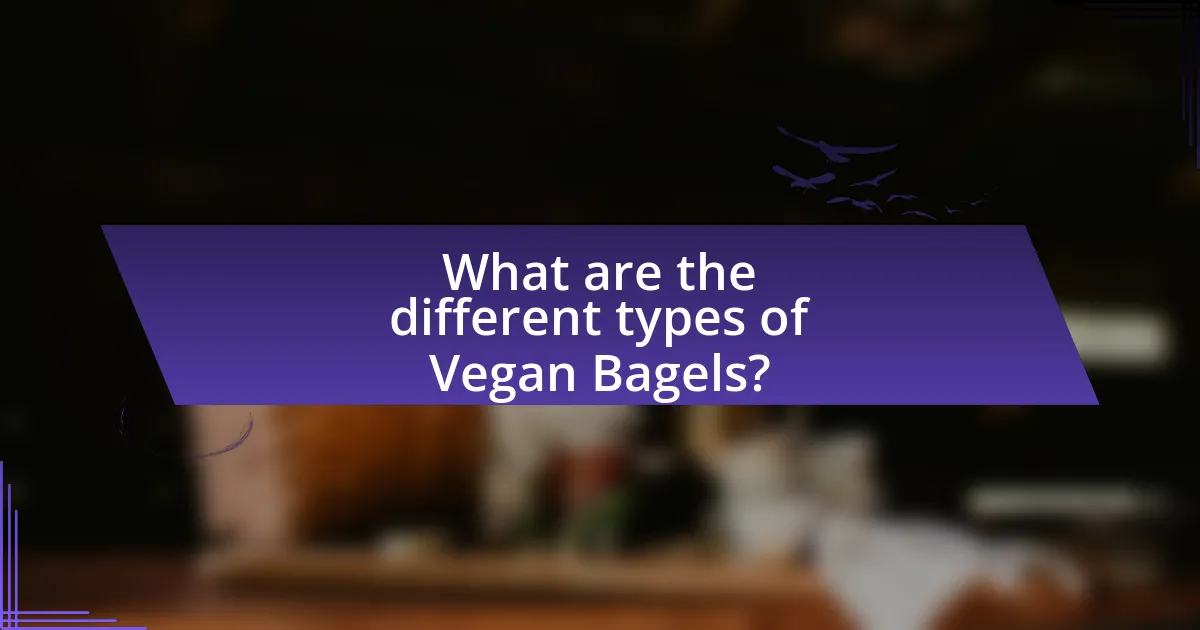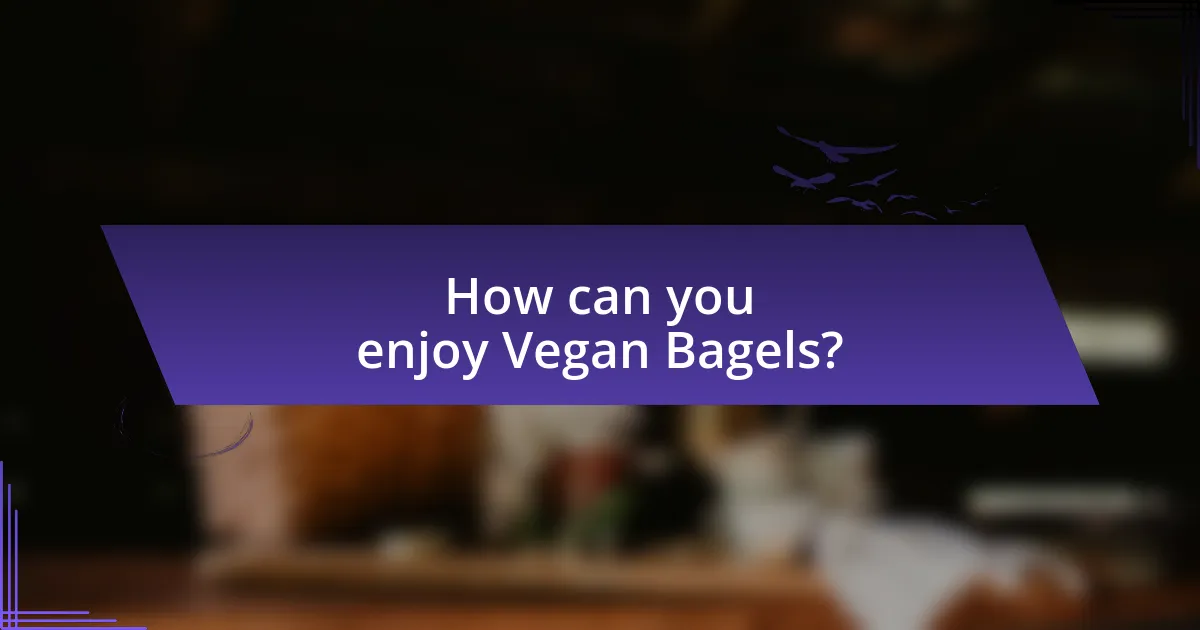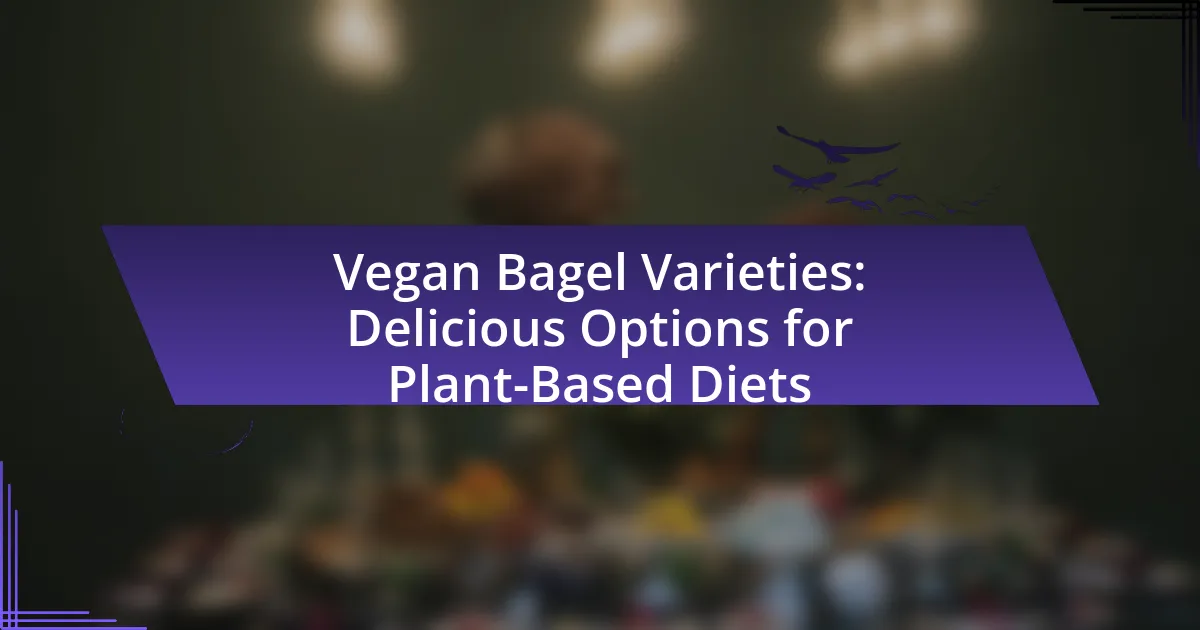Vegan bagel varieties encompass a range of flavors including plain, everything, sesame, onion, garlic, and poppy seed, all made without animal-derived ingredients. These bagels differ from traditional options primarily in their use of plant-based substitutes for dairy and eggs, resulting in unique flavors and textures. Common ingredients include flour, water, yeast, and sweeteners, which contribute to their nutritional benefits such as lower cholesterol and higher fiber content. The article also explores customization options for various diets, popular toppings, and tips for making vegan bagels at home, ensuring they remain a versatile and health-conscious choice for those following plant-based diets.

What are Vegan Bagel Varieties?
Vegan bagel varieties include plain, everything, sesame, onion, garlic, and poppy seed bagels. These options are made without any animal-derived ingredients, typically using flour, water, yeast, and salt, ensuring they align with plant-based diets. The everything bagel, for instance, is topped with a mix of seeds and spices, while the onion and garlic varieties incorporate those flavors directly into the dough, providing distinct tastes that appeal to a wide range of preferences.
How do Vegan Bagels differ from traditional bagels?
Vegan bagels differ from traditional bagels primarily in their ingredients, as vegan bagels do not contain any animal products, while traditional bagels typically include ingredients like eggs or dairy. Traditional bagels often use milk or honey in the dough, whereas vegan bagels substitute these with plant-based alternatives such as almond milk or agave syrup. This distinction allows vegan bagels to cater to those following a plant-based diet, ensuring they remain free from animal-derived components.
What ingredients are commonly used in vegan bagels?
Vegan bagels commonly use ingredients such as flour, water, yeast, salt, and sweeteners like agave or maple syrup. These components create a dough that is both plant-based and suitable for vegan diets. The absence of dairy and eggs distinguishes vegan bagels from traditional varieties, ensuring they align with plant-based dietary preferences.
How does the absence of animal products affect the flavor and texture?
The absence of animal products in vegan bagels significantly alters both flavor and texture. Without dairy and eggs, the flavor profile shifts towards more plant-based ingredients, often incorporating spices, herbs, and alternative fats like avocado or nut butters to enhance taste. The texture also changes; traditional bagels rely on the elasticity provided by gluten and the moisture from animal products, while vegan versions may use ingredients like aquafaba or flaxseed to mimic this elasticity, resulting in a denser or chewier consistency. Studies show that plant-based alternatives can achieve similar sensory qualities through careful ingredient selection and preparation methods, demonstrating that flavor and texture can be effectively balanced in vegan baking.
What are the health benefits of choosing vegan bagels?
Choosing vegan bagels offers several health benefits, primarily due to their plant-based ingredients. Vegan bagels typically contain no cholesterol, which can contribute to better heart health. Additionally, they often include whole grains, providing dietary fiber that aids digestion and helps maintain a healthy weight.
Research indicates that diets rich in whole grains can lower the risk of chronic diseases such as type 2 diabetes and cardiovascular issues. For instance, a study published in the American Journal of Clinical Nutrition found that higher whole grain intake is associated with a reduced risk of heart disease. Furthermore, vegan bagels can be lower in saturated fats compared to traditional bagels made with dairy or eggs, promoting overall health.
In summary, the health benefits of choosing vegan bagels include improved heart health, increased fiber intake, and a lower risk of chronic diseases, supported by scientific research on whole grains and plant-based diets.
How do vegan bagels contribute to a balanced diet?
Vegan bagels contribute to a balanced diet by providing essential carbohydrates, fiber, and nutrients without animal products. These bagels are typically made from whole grains, which offer complex carbohydrates that supply energy and dietary fiber that aids digestion. Additionally, many vegan bagels incorporate seeds or nuts, enhancing their protein content and providing healthy fats. For instance, a whole grain vegan bagel can contain around 3-4 grams of fiber and 8-10 grams of protein, contributing to daily nutritional needs. This combination supports overall health, making vegan bagels a suitable option for those seeking a plant-based diet.
What nutritional advantages do vegan bagels offer compared to regular bagels?
Vegan bagels typically offer lower saturated fat and cholesterol levels compared to regular bagels, which often contain dairy or eggs. This reduction in saturated fat and cholesterol can contribute to better heart health and lower the risk of cardiovascular diseases. Additionally, vegan bagels may include whole grains and seeds, enhancing their fiber content, which aids in digestion and promotes satiety. Studies indicate that diets high in fiber can reduce the risk of chronic diseases, further supporting the nutritional advantages of vegan bagels.

What are the different types of Vegan Bagels?
Vegan bagels come in various types, including plain, everything, sesame, onion, garlic, and cinnamon raisin. Each type offers unique flavors and textures suitable for plant-based diets. For instance, everything bagels are topped with a mix of seeds and spices, while cinnamon raisin bagels provide a sweet option. These varieties are made without animal products, ensuring they align with vegan dietary preferences.
What are the most popular flavors of vegan bagels?
The most popular flavors of vegan bagels include everything, sesame, onion, and plain. These flavors are widely favored due to their versatility and appeal in both savory and sweet applications. The “everything” bagel, which combines various toppings like poppy seeds, garlic, and onion, has become particularly iconic in bagel culture, often celebrated for its robust flavor profile. Sesame bagels offer a nutty taste, while onion bagels provide a savory option that pairs well with various spreads. Plain bagels remain a classic choice, serving as a neutral base for toppings.
How do savory vegan bagel options compare to sweet ones?
Savory vegan bagel options typically feature ingredients like herbs, spices, and vegetables, while sweet vegan bagels often include fruits, sugars, or sweeteners. The flavor profiles of savory bagels tend to be more robust and complex, appealing to those who prefer umami and salty tastes, whereas sweet bagels cater to those who enjoy sugary and fruity flavors. Nutritionally, savory bagels may offer more fiber and vitamins from vegetables, while sweet bagels can be higher in sugars and calories. This distinction is important for individuals choosing bagels based on dietary preferences or health considerations.
What unique ingredients can be found in specialty vegan bagels?
Specialty vegan bagels often include unique ingredients such as activated charcoal, nutritional yeast, and various seeds like chia or hemp. Activated charcoal is used for its striking color and detoxifying properties, while nutritional yeast adds a cheesy flavor and is rich in B vitamins. Chia and hemp seeds contribute to the nutritional profile by providing omega-3 fatty acids and protein, making these bagels not only visually appealing but also healthful options for plant-based diets.
How can vegan bagels be customized for different diets?
Vegan bagels can be customized for different diets by altering ingredients and toppings to meet specific dietary needs. For gluten-free diets, gluten-free flour blends can replace traditional wheat flour, ensuring the bagels remain suitable. For low-carb diets, almond flour or coconut flour can be used instead of high-carb flours, significantly reducing carbohydrate content. Additionally, for those following a high-protein diet, incorporating protein-rich ingredients like chickpea flour or adding seeds such as chia or flaxseed can enhance the protein profile. Furthermore, toppings can be adjusted; for example, using avocado or hummus instead of cream cheese caters to those avoiding dairy, while adding vegetables or plant-based spreads can align with whole-food or raw diets.
What options are available for gluten-free vegan bagels?
Gluten-free vegan bagels are available in several options, including those made from almond flour, coconut flour, and chickpea flour. These flours provide a base that is both gluten-free and plant-based, catering to dietary restrictions. Brands like “Baked in Brooklyn” and “Canyon Bakehouse” offer gluten-free vegan bagels that are widely available in grocery stores. Additionally, many recipes online allow for homemade versions using gluten-free flour blends, ensuring a variety of flavors and textures.
How can vegan bagels be adapted for low-carb diets?
Vegan bagels can be adapted for low-carb diets by using alternative flours such as almond flour or coconut flour instead of traditional wheat flour. These low-carb flours significantly reduce the carbohydrate content while maintaining a suitable texture. For instance, almond flour contains only about 10 grams of carbohydrates per 100 grams, compared to approximately 75 grams in regular wheat flour. Additionally, incorporating ingredients like psyllium husk can help bind the dough and improve the bagel’s structure without adding carbs. This adaptation allows individuals following low-carb diets to enjoy vegan bagels while adhering to their dietary restrictions.

How can you enjoy Vegan Bagels?
You can enjoy vegan bagels by topping them with a variety of plant-based spreads and ingredients. Popular options include avocado, hummus, nut butters, or vegan cream cheese, which enhance the flavor and nutritional value of the bagel. Additionally, adding fresh vegetables like tomatoes, cucumbers, or spinach can provide crunch and freshness. According to a study published in the Journal of Food Science, incorporating diverse toppings can significantly increase the overall satisfaction and health benefits of meals, making vegan bagels a versatile choice for plant-based diets.
What are the best toppings for vegan bagels?
The best toppings for vegan bagels include avocado, hummus, nut butters, vegan cream cheese, and fresh vegetables. Avocado provides healthy fats and a creamy texture, while hummus adds protein and flavor. Nut butters, such as almond or peanut butter, offer a rich taste and are nutrient-dense. Vegan cream cheese alternatives, made from nuts or soy, mimic traditional cream cheese and enhance the bagel experience. Fresh vegetables like tomatoes, cucumbers, and sprouts add crunch and freshness, making them ideal toppings for a nutritious vegan bagel.
How do spreads enhance the flavor of vegan bagels?
Spreads enhance the flavor of vegan bagels by adding diverse tastes and textures that complement the bagel’s base. For instance, creamy avocado spread introduces a rich, buttery flavor, while hummus provides a savory, protein-rich option. Additionally, fruit-based spreads like jam or nut butters contribute sweetness and depth, creating a balanced flavor profile. The variety of spreads allows for customization, catering to different palates and dietary preferences, thus elevating the overall eating experience of vegan bagels.
What are some creative ways to serve vegan bagels?
Creative ways to serve vegan bagels include topping them with avocado and cherry tomatoes for a fresh, nutritious option, or using hummus and roasted vegetables for a savory twist. Additionally, bagels can be served with a spread of nut butter and banana slices for a sweet treat, or filled with vegan cream cheese and fresh herbs for a classic flavor. These combinations not only enhance the taste but also provide a variety of textures and nutrients, making vegan bagels a versatile choice for plant-based diets.
What are some tips for making vegan bagels at home?
To make vegan bagels at home, use a combination of flour, water, yeast, and a sweetener like maple syrup or agave nectar. Ensure the dough is well-kneaded for about 10 minutes to develop gluten, which gives the bagels their chewy texture. Allow the dough to rise until it doubles in size, typically 1 to 2 hours. When shaping the bagels, create a hole in the center and ensure it is wide enough, as it will shrink during boiling and baking. Boil the bagels in water with a bit of baking soda for about 30 seconds on each side to achieve a glossy crust. Finally, bake them at a high temperature, around 425°F (220°C), for 20-25 minutes until golden brown. These steps are essential for achieving the desired texture and flavor in vegan bagels.
What essential ingredients do you need for homemade vegan bagels?
To make homemade vegan bagels, you need flour, water, yeast, salt, and a sweetener such as sugar or agave syrup. Flour serves as the primary structure, while water activates the yeast, which is essential for leavening. Salt enhances flavor and controls yeast activity, and the sweetener helps to feed the yeast, promoting fermentation. These ingredients combine to create the dough that forms the basis of bagels, ensuring they have the right texture and taste.
How can you ensure the perfect texture when baking vegan bagels?
To ensure the perfect texture when baking vegan bagels, use a combination of high-gluten flour and proper hydration levels. High-gluten flour, such as bread flour, provides the necessary protein content to create a chewy texture, while maintaining a hydration level of around 60-65% helps achieve the desired dough consistency. Additionally, boiling the bagels before baking enhances their crust and contributes to a chewy interior, a technique supported by traditional bagel-making practices.
What are common mistakes to avoid when preparing vegan bagels?
Common mistakes to avoid when preparing vegan bagels include not using the right flour, which can affect texture and flavor. Many recipes require high-gluten flour for the best chewiness; using all-purpose flour may result in a denser bagel. Additionally, failing to properly proof the dough can lead to bagels that are too dense or do not rise adequately. Over-kneading the dough can also make bagels tough, while under-kneading can prevent proper gluten development. Lastly, neglecting to boil the bagels before baking can result in a less chewy texture, as boiling helps create the characteristic crust.
How can over-proofing affect the final product?
Over-proofing can lead to a final product that is overly airy and lacks structure. When dough is over-proofed, the yeast consumes too much sugar, resulting in excessive gas production, which can cause the bagel to collapse during baking. This collapse leads to a dense texture and uneven crumb, negatively impacting the overall quality of the bagel. Additionally, over-proofed bagels may develop a sour taste due to the prolonged fermentation process, which can detract from the intended flavor profile.
What should you watch out for when selecting vegan ingredients?
When selecting vegan ingredients, it is crucial to watch out for hidden animal products and additives. Many processed foods labeled as vegan may still contain ingredients like gelatin, casein, or certain colorings derived from insects, which are not suitable for a vegan diet. Additionally, cross-contamination with non-vegan products during manufacturing can occur, so checking for certifications or labels indicating vegan compliance is essential. According to the Vegan Society, awareness of ingredient sourcing and production practices helps ensure adherence to vegan principles.



